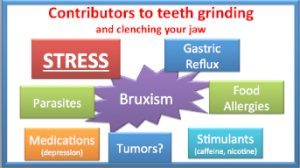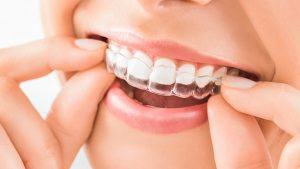
Clenching and grinding your teeth is a condition known as bruxism. This can happen while you’re asleep, or you may be clenching and grinding your teeth while you’re wide awake without even realizing it!
Bruxism can cause a plethora of problems, so it’s important to be aware of some common signs. If you notice any of the following, please discuss them at your next dental appointment:
- Headache
- Jaw, face or even neck pain – can radiate to the ear
- Damage to your teeth or restorations including flattening, fracturing, or even loose teeth
- Enamel wear leading to increased sensitivity
- Gum recession
- Abfraction (loss of tooth structure where the tooth meets the gum)
What causes bruxism?
Stress and anxiety are leading contributors of bruxism. With all the added stressors  we face these days, it’s important to keep an eye out for signs that you may be clenching or grinding. Avoid stimulants, such as caffeine and tobacco and limit alcohol intake.
we face these days, it’s important to keep an eye out for signs that you may be clenching or grinding. Avoid stimulants, such as caffeine and tobacco and limit alcohol intake.
Bruxism is seen more often in conjunction with certain personality types – especially those that are more “high strung” or hyperactive. It is also more prevalent among young children.
Sleep bruxism is common among family members and is also sometimes seen in conjunction with other sleep disorders, such as sleep apnea.
How to treat Bruxism:
Depending on the severity of your symptoms and what might be causing your bruxism, there are different modalities to treat it. A clinical evaluation by your dentist or physician is recommended. Treatment methods include options such as:
- Medications

- Behavioral/relaxation techniques
- Occlusal appliances
One of the easiest ways to try to treat bruxism and save your teeth, is to invest in a night guard. Custom night guards that are fitted to your teeth and bite are recommended. A night guard is usually fitted to your upper teeth and is a quick and painless procedure. An appointment would be required to take impressions of your teeth – then it’s off to the lab and will be properly fitted for your mouth upon its return.
Talk to one of our dentists the next time you’re in if you’re concerned about the effects of bruxism on your teeth.

